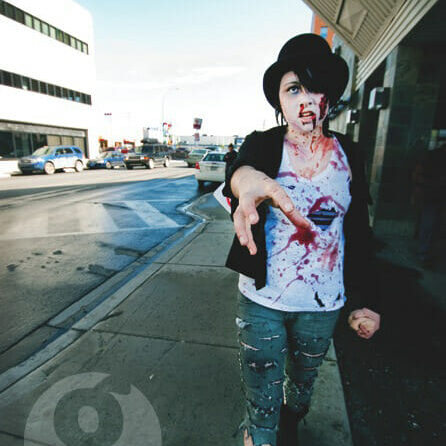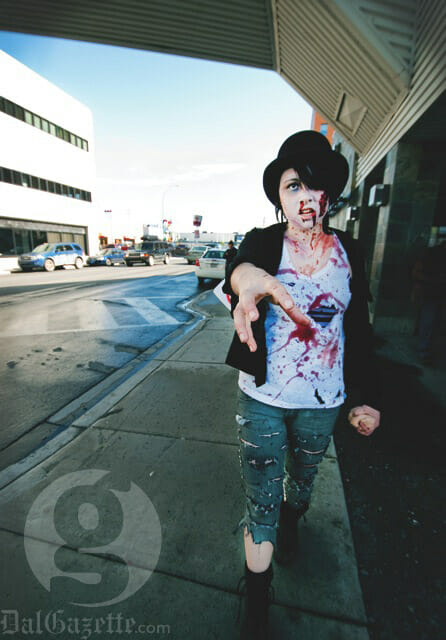
Like a lot of people who didn’t get all the presents they wanted for Christmas, I went online early on Dec. 26 to browse for deals. The main gift I was looking for was The Walking Dead: Compendium One, a 1088-page graphic novel by Image Comics writer Robert Kirkman.
Now, I don’t particularly have a fascination with zombies. But I am fascinated by how many people are enamoured by them. I read a few of the 22 reviews online and this collection seemed popular. In fact, it currently sits at number one on Amazon’s list of graphic novels, and has maintained a spot in the Top 100 graphic novels sold by Amazon for 721 days at the time of writing. (Seven more Walking Dead titles occupied the Top 20 graphic novels sold by Amazon as well.)
Upon receiving my Amazon shipment (which at more than a 1000 pages was pretty heavy—so heavy I could probably kill a zombie with it), something on the back of the book caught my eye.
“The world we knew is gone,” wrote what I assume to be the collection’s author, Robert Kirkman. “The world of commerce and frivolous necessity has been replaced by a world of survival and responsibility.”
This seemed pretty humourous to me, considering that five days ago I had ordered this graphic novel with my frivolous credit card, as I assume many early-morning Boxing Day shoppers had.
As a collective society, zombies now dominate our popular culture. I’m not really sure how this happened, being that the idea of zombies and the zombie apocalypse has been in our collective consciousness for a long time.
It began with the indie horror breakthrough Night of the Living Dead by director George A. Romero, and continued into the 1980s with the director’s seminal Dawn of the Dead, an apocalyptic zombie thriller set in a suburban shopping mall. Then the whole fascination with zombies seemed to die down, except among goofy teenagers who enjoyed cult horror flicks about the undead.
But in the mid-2000s things started to heat up. A remake of Romero’s Dawn of the Dead was a hit at the box office; British director Danny Boyle (yes, of Slum Dog Millionaire fame) released 28 Days Later; even funnyman Simon Pegg released a satire on zombie culture with Shaun of the Dead.
By 2010, zombie fiction really broke into the mainstream. The aforementioned Robert Kirkman’s *The Walking Dead* was commissioned as a series by AMC, a show that, as Cracked.com editor Dan O’brien points out, is weird because, “The people who don’t like the show don’t watch it, but the people who love this show hate it.” This is mostly due to a lack of zombies and a boring plot. But even though the fans that watch the show actually hate it, The Walking Dead remains popular. The show even inspired The Centre for Disease Control and Prevention (CDC) to issue a mock guide on how to survive a zombie apocalypse as a way to teach people who are obsessed with zombies techniques to actually prevent outbreaks (zombie or otherwise).
Let’s not forget relatively innocuous uses of zombies in fiction, such as Seth Graeme-Smith’s Pride and Prejudice and Zombies, a book that combines stuffy British literature with zombie fiction purely because the Jane Austen novel was public domain and, hey, people seem to like zombies. (It became a New York Times bestseller.)
Now, I can somewhat understand the interest behind zombies. They’re kind of creepy, kind of gross, and allow viewers to witness mind-numbing violence without empathy for the things being murdered. What I don’t understand is why it has become so ingrained in popular culture that anytime I browse the book section at HMV I’m not only likely to find books on Chuck Norris and picture books of Cats with hilarious captions, but products with zombies associated with them that seem only to mention zombies to make their product quirky and sell more copies.
Like jokes about Chuck Norris and those I Lyke Cheezburger Cats, zombies and the zombie apocalypse have become this meme whereby having any kind of interest in the undead makes the shopper somewhat more interesting than before.
I think of the Kirkman collection that discusses a world without frivolous goods. I think of the people at AMC, a television channel that made its big break with a show about marketing schemes in the 1960s, releasing an otherwise redundant show about a zombie apocalypse. And then I think of George A. Romero and his Dawn of the Dead, a movie that was awesome because it had zombies in it, but more so because it was a nicely packaged social commentary on American shoppers.
I think about all this stuff and I wonder: Have we become the zombie shoppers in Dawn of the Dead, except we’re shopping for things about zombies?
I think about this paradox and begin to feel brain dead.







